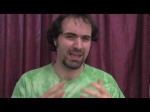By Mark Burchick
Shamus Kelley shifts in his chair, first to the left, then to the right, as he mocks the performances in an episode of “Power Rangers RPM.”
As he describes a brief fight sequence, he shakes his fists and tugs at his shaggy, disordered hair. A shield pendant necklace bounces off of his red tie-dyed shirt, flailing madly with each accusatory finger-point.
“They throw Ziggy on a table and they’re like, ‘We’re going to make an example out of you!’ They have this giant kung fu fight over this Jell-O. It’s completely ridiculous,” Kelley said.
The 22-year-old Towson University senior has been a devoted fan of “Power Rangers,” typically considered children’s fare for an after school viewing audience, since he was young. The series, now in its 20th season, follows a group of teenagers, such as RPM’s Ziggy, Flynn, and Summer, who fight evil alien forces.
Kelley said his love for the show is hard to explain. “For all intensive purposes, ‘Power Rangers’ is this awful show. But there is a certain charm to it,” Kelley said.
For many current fans, “Power Rangers” plays on the nostalgia of rediscovering a show they remember from their childhood, Kelley said. He added that many viewers enjoy its “so bad, it’s good” quality.
Ryan Murray, Kelley’s former digital media studies professor, said that much of today’s popular culture focuses on making fun of things society views as bad through camp or parody.
“I think it’s an interesting mindset and a lot of good creative production has come out of it,” Murray added.
Although some viewers can turn off the TV and return to their normal lives, Kelley lives and breathes “Power Rangers.” Along with 10 strangers from across the nation, Kelley co-produces “Dan’s Toku Rants,” a prerecorded conversation, or “podcast,” which reaches hundreds on a weekly basis.
The podcast mainly focuses on “Power Rangers,” but also delves into other shows in the “Toku” genre: Japanese-based, special-effects-heavy superhero shows, Kelley said.
Kelley said that he has taken part in the show since its 14th episode, when Dan Pearce, the host, invited him on. The show is now on its 210th podcast and is still going strong, he said.
“It’s just this really fun thing to talk about,” Kelley said. “There is something to talk about if we can talk for 200 episodes and counting.”
Murray said his classes teach students how to spread content online while reaching specific audiences, citing Kelley as an example of what the class embodies.
The Internet has fueled opportunities for smaller communities, such as die-hard “Power Rangers,” to communicate. For example, Dan’s Toku Rant’s participants hail from Maryland, New York, Pennsylvania, California and various parts of the Midwest, Kelley said.
The “Power Rangers” fan domain, or “fandom,” has multiple forums, Facebook pages and podcasts for which fans can talk about their favorite aspects of the show, Kelley said.
“There are people who will post on forums and that’s just not my scene. I like it being more of a laid-back conversation and just chill with friends,” Kelley said, referring to why he podcasts.
Kelley said that for the most part, the podcast participants had never met in person until many of them attended Power Morphicon, a “Power Rangers” fan convention, in Pasadena, Calif., last year.
Kelley said it was fascinating how the Internet could bring together such a diverse group of people for something so specific. “Before the Internet, there was no way it could have happened,” Kelley said.
Kelley said that his work on producing a “Power Rangers” fan series for YouTube has allowed him to test out of four college courses. He added that connections through that series have nabbed him his current job at The Towerlight as the head producer of online video content.
The first time Ashley Beall, assistant video producer at The Towerlight, met Kelley, she said his enthusiasm was contagious. “He was so excited for me to want to join. I was like, this guy is excited for me? I am now excited,” Beall said.
She added that working under him is more often a team effort than a hierarchy.
As a graduating senior, Kelley attributes many of his successes in school to his love for the show, he said.
“Everyone has their own interests. Some people are into sports, some people are very into alcohol. I find that it’s just a really great thing to have fun with and it has inspired me in more ways than I can count,” Kelley said.
Occasionally, Kelley will podcast from The Towerlight office and Beall said she knows to be quiet. “It’s a big part of who he is and I know that for awhile, he was afraid to even talk about it,” Beall said.
“He is completely and 100 percent Shamus Kelley. I think that is important to him,” Beall said.
